
I got an e-mail the other day from a fellow who wanted to know how he should go about learning to play the drums without letting himself be influenced by anyone else. His primary concern was that he didn't want to take any lessons, but his reason for isolation was so that his playing would be totally unique.
We're influenced by everything we come into contact with. Everything you see goes into the photo album of your mind. Likewise, everything you hear and do goes into an equally deep mental repository. As musicians we all strive for an individual style. But in forming that style we take diverse elements from our experience - be they lessons, music we've heard, performances we've seen, conversations we've had, things we've read, and lots and lots of practice.
One of the primary influences on each of us is that group of people we admire; they may be drummers, they may be writers, philosophers, composers, artists, friends.... They help shape not only our playing but also our professional outlook. This page is a humble tribute to those individuals - mostly musicians - who have helped shape me as a musician. I hope you enjoy this little introduction.
![]()
![]()
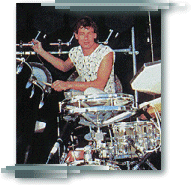 Bill
exemplifies to me the musician who is willing to take risks; who isn't
afraid to step out of the mainstream and go against the grain, regardless
of the cost. He has said, "The most famous thing I ever did was quit
Yes." Immediately after the smashingly successful CLOSE TO THE EDGE
album, just when Yes had nailed down their progressive superiority - nothing
seemed to be out of reach - Bill bails for King Crimson. Crimson was a
successful band at the time, but nowhere near Yes' stature in the marketplace.
Why did he do this? "For the music." Yes no longer challenged
Bill. He felt he had done it all - that the next Yes album would be CTTE,
part 2.
Bill
exemplifies to me the musician who is willing to take risks; who isn't
afraid to step out of the mainstream and go against the grain, regardless
of the cost. He has said, "The most famous thing I ever did was quit
Yes." Immediately after the smashingly successful CLOSE TO THE EDGE
album, just when Yes had nailed down their progressive superiority - nothing
seemed to be out of reach - Bill bails for King Crimson. Crimson was a
successful band at the time, but nowhere near Yes' stature in the marketplace.
Why did he do this? "For the music." Yes no longer challenged
Bill. He felt he had done it all - that the next Yes album would be CTTE,
part 2.
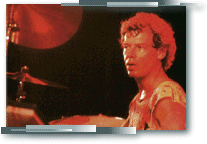 But,
he did it mostly so he could explore other musical avenues, and one avenue
Crimson offered that Yes did not was improvisation. Bill has always been
a jazzer, and Crimson's style of music was more closely aligned to that
idiom than was Yes'. It explains almost every career move he's made since
the 70's. His fusion band Bruford paved the way for the majestic Earthworks.
The latter is truly a remarkable phenomenon, one you should not pass up.
Bill takes electronic percussion to a musical level previous unattained
by any other percussionist. We still have a long way to go to catch up!
But,
he did it mostly so he could explore other musical avenues, and one avenue
Crimson offered that Yes did not was improvisation. Bill has always been
a jazzer, and Crimson's style of music was more closely aligned to that
idiom than was Yes'. It explains almost every career move he's made since
the 70's. His fusion band Bruford paved the way for the majestic Earthworks.
The latter is truly a remarkable phenomenon, one you should not pass up.
Bill takes electronic percussion to a musical level previous unattained
by any other percussionist. We still have a long way to go to catch up!
 I
like Bill so much, I named my dog after him! She's a female, 1/2 Airedale,
1/4 German Shepard, 1/4 Black Lab. Lots of people wonder why I would name
a beautiful girl dog "Bruford". Well, here's the story: I had
a name for a male dog all picked out. Robert Smythe McCallister, or Bob
for short (I love giving the vets a three-part pet name!). Well, Bruford
turned out to be a girl, so I didn't know where to go on the name thing.
A friend at work said, "Why don't you name her after your favorite
drummer?"
I
like Bill so much, I named my dog after him! She's a female, 1/2 Airedale,
1/4 German Shepard, 1/4 Black Lab. Lots of people wonder why I would name
a beautiful girl dog "Bruford". Well, here's the story: I had
a name for a male dog all picked out. Robert Smythe McCallister, or Bob
for short (I love giving the vets a three-part pet name!). Well, Bruford
turned out to be a girl, so I didn't know where to go on the name thing.
A friend at work said, "Why don't you name her after your favorite
drummer?"
In March of 2006 we had to put our beloved Bruford to sleep. She was over 12 and she was having great difficulty standing - arthritis had pretty much destroyed her hips - she was going deaf, and she had lost 30 pounds, most likely due to cancer. It was a difficult decision, but it was the right thing to do. We miss her dearly; she taught us many things, chief of which was unconditional love.
- Elephant Talk - The King Crimson site.
- The Official Website of Bill Bruford and Bill Bruford's Earthworks - A feast for Bruford fans!
![]()
![]()
 When
Yes went looking for a drummer after CTTE, they didn't have to go far;
mutual friend Alan White was waiting in the wings. While it may seem that
my musical taste is narrow because my first two drummers are both from
Yes, there is no doubt that the band has had a profound impact on how I
approach my music. Both Alan and Bill represent the two poles of my musical
expression: experimental jazz on the one side, solid deep-pocket rock on
the other. Both drummers can cross over into the other's territory at will,
as they have demonstrated over the years. However, each remains a distinctive
force in that area he has carved out for himself. As rock drummers go,
few can lay it down with as much inventiveness as Alan White.
When
Yes went looking for a drummer after CTTE, they didn't have to go far;
mutual friend Alan White was waiting in the wings. While it may seem that
my musical taste is narrow because my first two drummers are both from
Yes, there is no doubt that the band has had a profound impact on how I
approach my music. Both Alan and Bill represent the two poles of my musical
expression: experimental jazz on the one side, solid deep-pocket rock on
the other. Both drummers can cross over into the other's territory at will,
as they have demonstrated over the years. However, each remains a distinctive
force in that area he has carved out for himself. As rock drummers go,
few can lay it down with as much inventiveness as Alan White.
 Alan
has remained with Yes since Bill's departure. While he has not travelled
as far afield musically as Bill, he has become involved in clinic work
and continues to hone his composing skills. An accomplished pianist (the
piano was his first instrument), he is increasingly seen as a compositional
contributor to Yes music, not just as a the rhythmic backbone of the band.
Considered one of the true gentlemen of the music business, he has remained
faithful to the spirit and mission of Yes, and along with bassist Chris
Squire has kept the band's flame alive during its many lulls.
Alan
has remained with Yes since Bill's departure. While he has not travelled
as far afield musically as Bill, he has become involved in clinic work
and continues to hone his composing skills. An accomplished pianist (the
piano was his first instrument), he is increasingly seen as a compositional
contributor to Yes music, not just as a the rhythmic backbone of the band.
Considered one of the true gentlemen of the music business, he has remained
faithful to the spirit and mission of Yes, and along with bassist Chris
Squire has kept the band's flame alive during its many lulls.
- Alan White - The official Alan White site maintained by Notes From The Edge. Very nice, but not regularly updated.
- YesWorld - One of the best Yes sites on the web.
- White - Alan has released his first solo project in 30 years with a new band called White. It's excellent!
- circa: - Alan has teamed up with former Yes-mates Billy Sherwood, Tony Kaye, and LA session great Jimmy Huan for this stellar new band. circa: 2007 is out now!
![]()
![]()
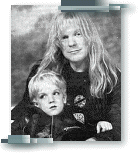 Larry
is best known as the Father of Christian rock and roll. Which gets him
into trouble, as a general rule. While many in the church are busy denouncing
rock and roll as the devil's music, folks in the secular arena are busy
denigrating Christian rock as insignificant. Those stuck in the middle
tend to see musical forms as spiritually neutral, until they are put into
their lyrical context. Larry is the first to dare to put Christian lyrics
into a rock music idiom. He was simultaneously deified and villified by
divergent corners of the music press, on both sides of the spiritual isle.
Larry
is best known as the Father of Christian rock and roll. Which gets him
into trouble, as a general rule. While many in the church are busy denouncing
rock and roll as the devil's music, folks in the secular arena are busy
denigrating Christian rock as insignificant. Those stuck in the middle
tend to see musical forms as spiritually neutral, until they are put into
their lyrical context. Larry is the first to dare to put Christian lyrics
into a rock music idiom. He was simultaneously deified and villified by
divergent corners of the music press, on both sides of the spiritual isle.
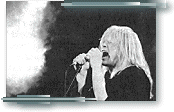 Regardless
of what one thinks of "Christian Rock and Roll", one can't deny
Larry's impact on the music world. Through his street ministry and the
help and assistance he lent to a whole generation of aspiring Christian
musicians, he shaped a ministry that has affected the world - carried on
even by those who don't know who he is and what they owe him. Because Larry
took the lumps, they can witness with relative ease. Regardless of the
wealth of talent that has sprung up since Larry first paved the way, it
is still only Larry's music and message that moves me profoundly. When
I get to heaven the first three people I will look for are Jesus, my wife,
and Larry (then my kids!); I want to thank him for all he's done for me.
Regardless
of what one thinks of "Christian Rock and Roll", one can't deny
Larry's impact on the music world. Through his street ministry and the
help and assistance he lent to a whole generation of aspiring Christian
musicians, he shaped a ministry that has affected the world - carried on
even by those who don't know who he is and what they owe him. Because Larry
took the lumps, they can witness with relative ease. Regardless of the
wealth of talent that has sprung up since Larry first paved the way, it
is still only Larry's music and message that moves me profoundly. When
I get to heaven the first three people I will look for are Jesus, my wife,
and Larry (then my kids!); I want to thank him for all he's done for me.
[On Sunday, February 24, 2008, after a long illness, Larry passed from this world into his eternal reward with his Lord. His life was full of music, love, and compassion. Through everything he always honored Jesus and served Him. Larry, you will always be an inspiration - may your music continue to point people to Jesus.]
- The Larry Norman Website - The Official site. Larry has a strange sense of humor....
![]()
![]()
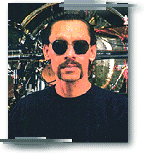 While
the next drummer influence may seem out of place, Alex Van Halen proves
to me to be quite an intriguing fellow. I'll readily admit that I don't
like Van Halen's music much; I don't care for their lyric content and their
music - while spirited - seems to me to be run-of-the-mill California rock
and roll. My interest in the band is solely due to Alex's playing. He is,
in my opinion, the finest rock and roll drummer alive. The authority and
power he imbues are what propel Van Halen's music to that "higher"
level. Forget the macho hystrionics of the front men: listen to the heartbeat
of the rhythm section: no one lays it down like Alex.
While
the next drummer influence may seem out of place, Alex Van Halen proves
to me to be quite an intriguing fellow. I'll readily admit that I don't
like Van Halen's music much; I don't care for their lyric content and their
music - while spirited - seems to me to be run-of-the-mill California rock
and roll. My interest in the band is solely due to Alex's playing. He is,
in my opinion, the finest rock and roll drummer alive. The authority and
power he imbues are what propel Van Halen's music to that "higher"
level. Forget the macho hystrionics of the front men: listen to the heartbeat
of the rhythm section: no one lays it down like Alex.
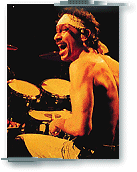 Certain
things about Alex's playing stand out: his sense of time, his incredibly
deep pocket, his inventiveness within the confines of the rock-radio form,
and his sound. While I'm unfamiliar with 95% of Van Halen's catalog, I
can always pick out their music on the radio by Alex's snare drum. How
does he get that sound? Completely unique, I'm convinced it has something
to do with volume. Alex once commented that Van Halen has the loudest monitor
mix in the business; while the photo at the right sees the band moving
to ear monitors, they have always strived to get a "live sound"
on all their studio recordings. Listen to that snare drum: the walls of
the recording studio must be shaking!
Certain
things about Alex's playing stand out: his sense of time, his incredibly
deep pocket, his inventiveness within the confines of the rock-radio form,
and his sound. While I'm unfamiliar with 95% of Van Halen's catalog, I
can always pick out their music on the radio by Alex's snare drum. How
does he get that sound? Completely unique, I'm convinced it has something
to do with volume. Alex once commented that Van Halen has the loudest monitor
mix in the business; while the photo at the right sees the band moving
to ear monitors, they have always strived to get a "live sound"
on all their studio recordings. Listen to that snare drum: the walls of
the recording studio must be shaking!
- Van Halen - Official Van Halen site.
![]()
![]()
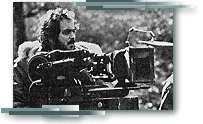 I
started life as a filmmaker. Forced to wear glasses early in life by a
doctor who thought 20/30 vision was something that needed correcting, I
went around framing up my life's events in the prescineum of my glasses'
frames. A brief stint in film school couldn't keep me out of television:
I needed the job. My love for film has never abated, and Stanley Kubrick
has epitomized to me the supreme cinema-artiste-terrible. His sense of
perfectionism and his skill with the camera are nothing short of lyrical.
Whenever I want to see something inspiring on the screen, I turn to a Kubrick
film: there's always something fresh to astound me.
I
started life as a filmmaker. Forced to wear glasses early in life by a
doctor who thought 20/30 vision was something that needed correcting, I
went around framing up my life's events in the prescineum of my glasses'
frames. A brief stint in film school couldn't keep me out of television:
I needed the job. My love for film has never abated, and Stanley Kubrick
has epitomized to me the supreme cinema-artiste-terrible. His sense of
perfectionism and his skill with the camera are nothing short of lyrical.
Whenever I want to see something inspiring on the screen, I turn to a Kubrick
film: there's always something fresh to astound me.
[On March 7, 1999,
Stanley Kubrick passed away; the world lost one of its premiere film talents.
One week before his death, Kubrick screened his final cut of EYES WIDE
SHUT for studio bosses. The film is considered a masterpiece by some; typically
disdained by those who fear Kubrick's talent. Stanley, we hardly knew ye.]
- Kubrick on the Web - A great compendium of Kubrick links.
- The Konformist Kubrick Tribute - A good tribute to Kubrick, and some good links.
![]()
![]()
 My
affinity to the music of Zappa sometimes gets me into trouble with the
people I know who really can't stand the man. I'll readily grant that Frank's
done many, many things in his career that offend people; his estate has
recently released a cd called "Have I Offended You?" which contains
examples of his most offensive stuff: he really managed to tick off just
about everybody! But, if you divorce the man's lyrics from the underlying
music you'll find a true modern virtuoso. Zappa did things to popular music
that many people are still trying to figure out. To say he was a genius
is an understatement. While his music can be challenging, it's always worth
picking apart: there are true gems under all that silliness!
My
affinity to the music of Zappa sometimes gets me into trouble with the
people I know who really can't stand the man. I'll readily grant that Frank's
done many, many things in his career that offend people; his estate has
recently released a cd called "Have I Offended You?" which contains
examples of his most offensive stuff: he really managed to tick off just
about everybody! But, if you divorce the man's lyrics from the underlying
music you'll find a true modern virtuoso. Zappa did things to popular music
that many people are still trying to figure out. To say he was a genius
is an understatement. While his music can be challenging, it's always worth
picking apart: there are true gems under all that silliness!
- The Real FZ Page - The Official Zappa site from the Zappa Family Trust.
- The Frank Zappa Meta-Page - Another compendium of Zappa links.
![]()
![]()
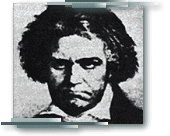 Have
you heard Beethoven's 9th Symphony lately? Put it on and listen to it straight
through. All by yourself, preferably at a good volume in a darkened room.
Pretty amazing, huh? Now, listen to it again and consider this: the man
couldn't hear a sound when he wrote it - stone deaf. All that music in
his brain, written down and never heard by his ears. The story goes that
when he conducted it for the first time he thought the public would hate
it. When the piece was over, he stood with his back to the audience (as
conductors do), with his head down, thinking he was a failure. The first
violinist got up and turned him around so he could see the standing ovation
he couldn't hear. We need to continue to strive for greatness, while at
the same time not pre-judging ourselves as failures (or successes, for
that matter). Let history judge us: we must continue with our work, undaunted
by life's obstacles. If Beethoven could write music when he was deaf, what
can't we do?
Have
you heard Beethoven's 9th Symphony lately? Put it on and listen to it straight
through. All by yourself, preferably at a good volume in a darkened room.
Pretty amazing, huh? Now, listen to it again and consider this: the man
couldn't hear a sound when he wrote it - stone deaf. All that music in
his brain, written down and never heard by his ears. The story goes that
when he conducted it for the first time he thought the public would hate
it. When the piece was over, he stood with his back to the audience (as
conductors do), with his head down, thinking he was a failure. The first
violinist got up and turned him around so he could see the standing ovation
he couldn't hear. We need to continue to strive for greatness, while at
the same time not pre-judging ourselves as failures (or successes, for
that matter). Let history judge us: we must continue with our work, undaunted
by life's obstacles. If Beethoven could write music when he was deaf, what
can't we do?
- Beethoven.com - An online radio station that play only Beethoven music.
- The Beethoven IRC Page - Go online for a Beethoven discussion! Includes links.
- Beethoven Resources - Great Beethoven resource.
![]()
![]()
